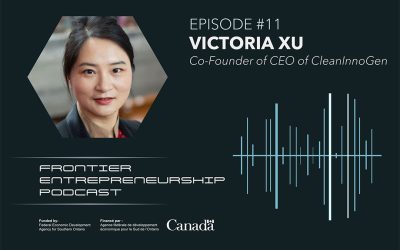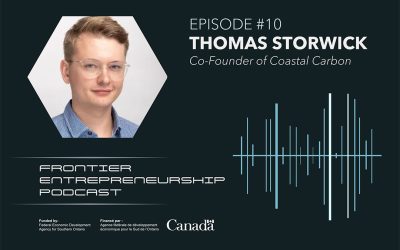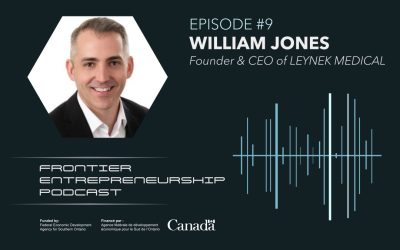
The Frontier Entrepreneurship Podcast
Thank you for joining us at the Frontier Entrepreneurship Podcast—brought to you by NCFDC, with the support of FedDev Ontario and the Government of Canada—and broadcasting from the Venture13 Entrepreneurship and Innovation Centre in Cobourg, Ontario.
We take you to the frontiers of creativity and innovation with entrepreneurs who are building the industries of the future. All voices featured in this special podcast series are those of Founders of start-up companies seed funded by NCFDC through initiatives like N1M and thriveFORWARD. Get to know their world, in conversation with Braden Kemp and Tracy Morningstar.
The Executive Producer of the Frontier Entrepreneurship Podcast is Robert Washburn. The production team at NCFDC includes John Hayden, Victoria Pichler, Daniela Scoppa and Sanjay Deoram. Special thanks to Chalmers McKeen from NXG Inc. for providing the recording equipment, and to the Town of Cobourg and Venture13.
The theme music “Distance” was written and performed by Australian-Canadian composer, Michelle Osis.
Host Tracy Morningstar
Prior to joining the Canadian Council for Aboriginal Business (CCAB) as Manager of Entrepreneurship, Tracy was the Administration Coordinator for New Gold during the construction phase of the Rainy River mine. After the construction phase of the mine, Tracy was responsible for a number of duties related to contract administration and large contract procurement practices. Prior to that, she worked as a Chef and Administrator for two food service companies in Northwestern Ontario. Tracy also enjoys pitching for the “Red Gut Babes” in the Rainy River District Women’s fastball league. She looks forward to watching the Toronto Blue Jays and Raptors games in the city.
Tracy is a member of the Collaborative Panel advising NCFDC on the thriveFORWARD Jobs and Growth Fund (JGF) initiative and innovation funding for start-ups and SMEs across Southern Ontario.
Host Braden Kemp
With more than a decade of experience in Canada’s technology commercialization industry, Braden has held senior roles in both the public and private sectors. As an entrepreneur, Braden currently operates a consulting practice and co-founded a manufacturing and e-commerce company that was acquired in early 2023. Braden has led growth companies and the organizations that support them in various positions including Director of Operations at venture-backed startup National Prostaff, and Director of Client Services at Spark Commercialization & Innovation Centre. As a volunteer, he served as the Vice Chair of Growth Management Strategy at the City of Kawartha Lakes.
In addition to Bioenterprise, Braden has worked as a consultant with organizations such as Durham College, NCFDC, 1855 Accelerator, Outdoorsponsors.com, Invest Barrie and others. Braden has been an advisor to a variety of technology companies in food-tech, 3D printing, agri-tech, military technology & training, influencer marketing, ecommerce, wearable tech, and more. Braden holds a Bachelor of Commerce in Economics from the University of Guelph and is a graduate of the Toronto Metropolitan University DMZ Accelerator program
Executive Producer Bio
A Reflection on the Concept of ‘Frontier Entrepreneurship'
Italian sociologist Franco Cassano once wrote, “the most restless frontiers are those that are not recognized.” This could be said of technology as much as of geography. Technological development is an endeavour of exploration and in its most extreme form, an often difficult and perilous journey to the new: to the novel and non-obvious (as notoriously required by the patent office), but in any event, to recognition.
This is not simply a matter of discovery (invention) but of development (the creation of value)–or, in the present political economy, to the commercialization of knowledge. In a dialectical mode, it is not surprising that Cassano describes frontiers equally as places of division and of opposition. Bringing a new technology product to market implies extreme confrontation: between startup and incumbent, between new and depreciating capital, between established methods and radical change, between owners and workers, between regulators, jurisdictions, markets and competitors, and between stakeholders, customers, founders, shareholders and communities at large. As terrain, these are hardly peaceful and quiescent landscapes. One could say that the charged and open frontier is where inventors, innovators and entrepreneurs are (again, following Cassano) “roaming restlessly…” continuously “watched” (Cassano’s action word) by corporations, governments, institutions and states.
Frontier Entrepreneurship is naturally an exhilarating ‘place’ to be (this is what gives entrepreneurship its heroic and expeditionary valence). But the frontier is also a dangerous place: full of risk, barriers and mountains to climb… of cycles, technics, troughs of disillusionment, valleys of death and even force majeure. Through all of this, Frontier Entrepreneurs are “watched” from places of safety and security with a curious mixture of doubt, resentment and admiration. The discovery and disruption they generate (at least until such time as the frontier is once again subsumed and a new frontier is created) will be characterized by vigorous opposition to the way things are and presage the way things may be in the future.
So then, what pushes an individual from the safe confines of the known world of business administration to the outer reaches of innovation and entrepreneurship? What drives them forward?
The etymology of the word “frontier” comes from the Latin, the feminine noun, frons, frontis, the forehead or brow. The root implies the fore of anything, the ‘forefront’, the ‘van’ (perhaps the ‘vanguard’, or the ‘avant-garde’). This includes the borderlands, the marches of a country, as in the old French, la frontière. While the nineteenth century American myth of the frontier and of frontierism is treated critically by historians today, one may nevertheless concede that a certain natural and positive human instinct appears to exist (trans-historically?) to “take that extra step” in pursuit of adventure, to search for and experience challenges posed by the unknown. In short, this hypothesis forms the basis of our conceptualization of ‘Frontier Entrepreneurship.’ A hypothesis (not an assumption) because no sharply defined terms are required. Our hope, with the Frontier Entrepreneurship podcast, is not only to explore extreme and innovative technologies and ventures at the very cutting edge, but also to encounter and better understand the Frontier Entrepreneurs themselves: to hear their stories and reflect on their experiences.
Cassano, Thinking the Frontier (2012) https://academic.oup.com/fordham-scholarship-online/book/20869/chapter-abstract/180354720
Mood, Notes on the History of the Word Frontier (1948), https://www.jstor.org/stable/3739265
Podcast Contact – Victoria Pichler
Victoria Pichler, NCFDC Marketing Communications Manager is available to answer any questions you may have.

Victoria Pichler
Marketing Communications Manager
Email Victoria
Latest News
Frontier Entrepreneurship Podcast Episode 11 – CleanInnoGen
Episode 11 of Season 1 brings you to the industrial frontier with Victoria Xu, impact entrepreneur, angel investor, and Founder of CleanInnoGen. Join co-hosts Braden Kemp and Tracy Morningstar as they explore how deeptech ventures are charting a course through the outer reaches of thermo-chemical engineering to a new era of net zero energy abundance.
Frontier Entrepreneurship Podcast Episode 10 – Coastal Carbon
Episode 10 of Season 1 brings you to the intersection of seaweed and artificial intelligence with Thomas Storwick, Co-Founder of Coastal Carbon. Thomas’ start-up is a southern Ontario-based innovation-driven enterprise supporting next generation sustainable aquaculture and marine ecosystem restoration.
Frontier Entrepreneurship Podcast Episode 9 – Leynek Medical
Episode 9 of Season 1 brings you to the frontier of medtech and digital health with William Jones, Founder & CEO of Leynek Medical. Leynek Medical is a southern Ontario-based start-up developing innovation-driven solutions in cancer oncology and patient care.





